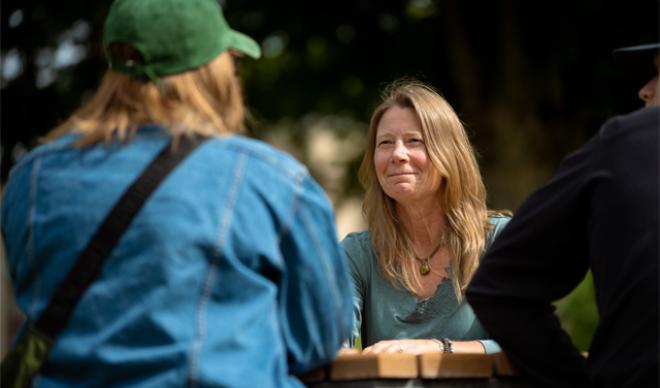
This story is included in the most recent issue of Quest Magazine, the College's twice-yearly Alumni publication. To view the entire issue online, or to view longer-form "Quest Extra" pieces, click here.
When Dr. Rochelle Johnson interviewed for a position at The College of Idaho in 1999, she hoped to work at a school where she could teach American literature, develop environmental studies courses, and spend time in the outdoors. Check, check, and check.
She already had experience teaching in much larger institutions but, having studied at a private liberal arts college herself, she preferred a smaller school. As she recalls, “The whole reason I’m a professor is because one day, toward the end of my undergraduate studies, I thought to myself: ‘I don’t ever want to leave this place!’”
In Idaho, Johnson interviewed for the open position that had been held by legendary English professor Dr. Louie Attebery ’50, who had been teaching at his alma mater since 1961. Those would be tough shoes to fill, so she gave up trying. As it turns out, Johnson’s holistic approach to education aligned perfectly with the practices established by Attebery and other esteemed figures at the College, making her contribution a natural extension of a long and beloved tradition.
“I don't see what I do here as individual work,” Johnson explains. “It's collective work, and it’s work that has gone on for generations and will far outlast me. As long as The College of Idaho remains The College of Idaho, I will have been part of a long line of people who mentor and encourage and challenge and befriend and support. I’m honored to be in this role.”
She was pleased to be able to design and develop an environmental studies major. The interdisciplinary major explores the intricate relationships between natural systems and human cultures, while also encompassing courses in the social sciences and the humanities. Johnson has chaired the Environmental Studies Department for several of the years since its establishment, which suits her well due to her background in the environmental humanities and natural history. Additionally, she led the College’s Gipson Honors and Heritage Scholar Programs for 18 years.
Johnson’s influence has been profound; even students who don’t take a class from her – such as Nikki Abercrombie ’11 – benefit from her guidance. Abercrombie had Johnson as a Heritage Scholar advisor. She says she found Johnson to be “one of the most intelligent and approachable faculty members I ever had the pleasure to interact with. Rochelle is the type of mentor who checks in on you from time to time instead of waiting for you to seek them out. Sometimes that is what I really needed.”
In response, Johnson says: “It's so funny because I often hope that I'm not intruding or bothering them when I just check in. I really care about my students, my advisees, people in the honors program. I want them to have a good college experience, and these are hard years.”
Her efforts have not gone unnoticed. In 2010, Johnson was recognized by the Carnegie Foundation for the Advancement of Teaching as the “Idaho Professor of the Year.” Perhaps the most influential aspect of Johnson’s teaching philosophy is her belief that the most important part of being a professor is not sharing knowledge. “The longer I do this, the more I think that is the least important thing I do,” she says, “which is probably anathema to most college and university educators, right? The most important thing we do here is teach students to believe in their own capacities to question and to feel compassion. And how we get there is really irrelevant. That's the most important thing: helping them find that part of themselves.”
The College of Idaho has a 132-year-old legacy of excellence. The College is known for its outstanding academic programs, winning athletics tradition, and history of producing successful graduates, including eight Rhodes Scholars, three governors, and countless business leaders and innovators. Its distinctive PEAK Curriculum challenges students to attain competency in the four knowledge peaks of humanities, natural sciences, social sciences, and a professional field—empowering them to earn a major and three minors in four years. The College’s close-knit, residential campus is located in Caldwell, where its proximity both to Boise and to the world-class outdoor activities of southwest Idaho’s mountains and rivers offers unique opportunities for learning beyond the classroom. For more information, visit www.collegeofidaho.edu.